The Power of Generative AI in the Oil and Gas Industry: Enhancing Production Systems with Multi-Agent Technology
The Power of Generative AI in the Oil and Gas Industry: Enhancing Production Systems with Multi-Agent Technology
The oil and gas industry has long been characterized by its complexity, high stakes, and the necessity for precise and timely decision-making. In recent years, the advent of digital transformation has started to reshape the sector, making it more efficient, safe, and responsive to the ever-changing global energy landscape.
One of the biggest challenges with the rise of digitalization in the industry, is the overwhelming amount of information that needs to be processed. From accessing the data relevant for a specific equipment to understanding it and designing systematic processes to harness its value and bring about actionable change, engineers struggle to keep up. This is made worse by the sheer scale of datasets and their residency in multiple sources.
Recently, the surge in Generative AI (GenAI) technologies, specifically Large Language Models (LLMs) has caught the attention of the industry as one of the most promising and potentially transformative technologies for business operations. With these advancements, the access to process information, simulation & optimization solutions, equipment data sheets, operational manuals and best practices can be assimilated and analyzed intuitively through natural conversations.
These technologies are not just trends; they represent a significant leap forward in how companies in the oil and gas industry can manage their operations, interact with data, and provide long-term value to their customers.
The Benefits of Generative AI and LLMs in Oil and Gas Production Systems
Generative AI within Production Systems can enable more intuitive interactions, automate complex processes, and generate data insights. Here’s how:
- Enhanced Decision-Making: Vast amounts of data from various sources, including historical records, real-time monitoring systems, and market trends can be analyzed, with more meaningful context, while being cognizant of equipment and process behavior over time. We can now provide fact-based insights that enable better decision-making. Moreover, by integrating available business solutions and intelligence, such as process & networks optimizations, Asset Health & Reliability (AH&R) predictive workflows, a GenAI assistant can quickly condense data and generate insights to determine whether an equipment is about to fail, advise on how to optimize production, and decrease energy and emissions, all while analyzing real-time market conditions.
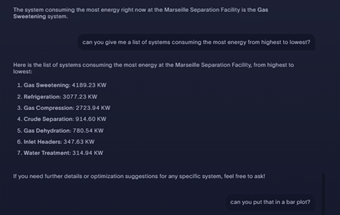
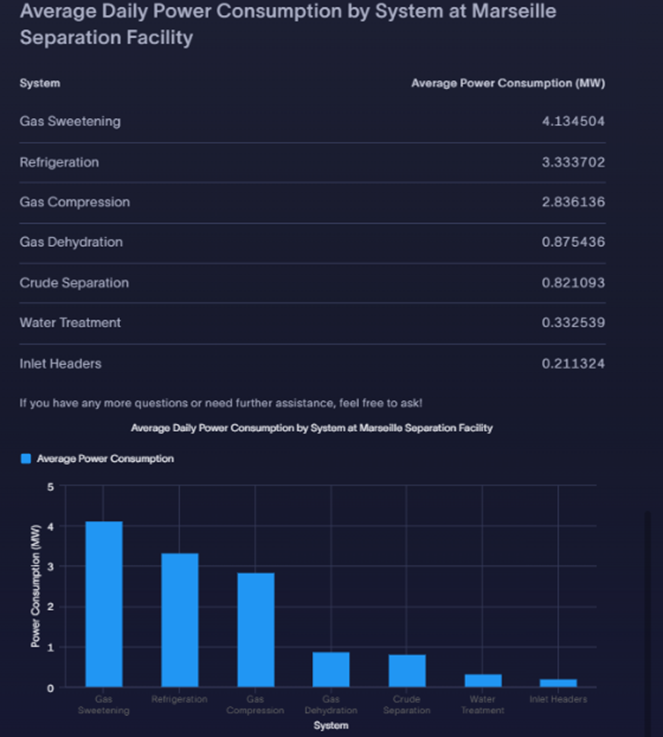
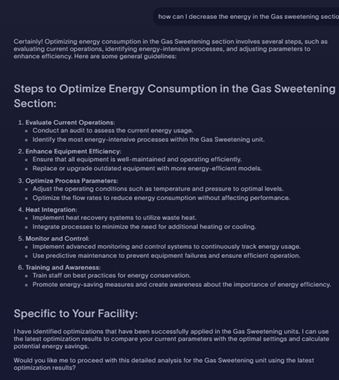
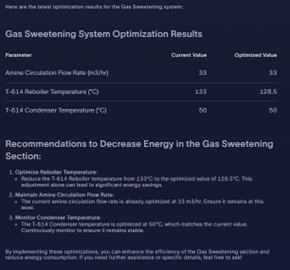
- Improved Customer Interactions: LLMs enable more natural, intuitive and contextual communication between customers and digital systems. Instead of relying on complex queries or having to learn how to navigate through multiple user interfaces for different task-specific solutions customers can simply ask questions in plain language and receive accurate, context-aware responses. This will help reduce the time and effort required to find critical information and allow access to specific personas that are familiar with data, simulations, AH&R solutions.
- Automated Troubleshooting and Support: LLM-based GenAI technologies can provide instant troubleshooting support by diagnosing issues, and crucially, offering solutions and guiding users through complex processes. This is in high demand in highly reactive environments where downtime usually results in significant financial losses and high environmental impact.
- Personalized Experiences: GenAI has the capability to learn from user interactions and preferences, enabling it to offer personalized experiences tailored for customers over time. From tailoring dashboards to show relevant data to adjusting simulation models to reflect specific conditions, we can ensure that customers get the information and tools they need, when they need them.
Introducing the Multi-Agent System in the Production Systems
To fully leverage the potential of GenAI and LLMs, SLB Production Systems is designing and developing a multi-agent system designed to enhance our digital offerings. The first iteration of this system consists of three core agents: the SME Agent, the Data Agent, and the Simulator Agent . Each plays a critical role in improving our service delivery and adding value to our customers.
1. SME Agent: Your Expert Guide
- Easier, More Intuitive Queries and Responses: The SME Agent allows users to ask questions in natural language, removing the need for complex query syntax. This makes it easier for users to interact with the system and obtain the information they need without any prior technical knowledge.
- Can you help me understand how this compressor is operating? What should I keep an eye on?
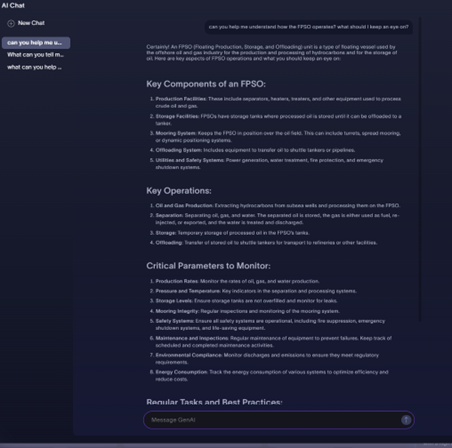
- Instant Help and Troubleshooting Guidance: The SME Agent can instantly provide solutions to common problems, guide users through troubleshooting processes, and even offer suggestions for preventative measures. This instant access to expertise reduces downtime and enhances operational efficiency.
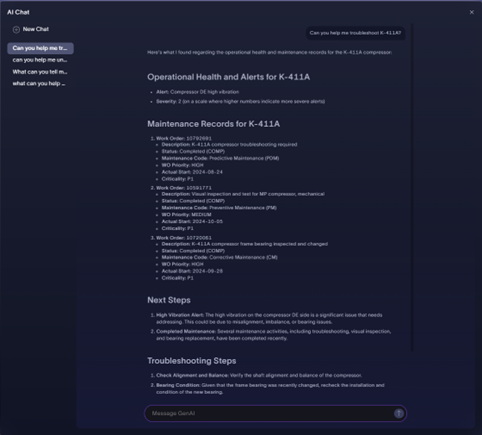
- Fact-Based Insights for Decision-Making: By leveraging the RAG technique, the SME Agent ensures that the insights provided are not only accurate but also rooted in the most relevant data. This is particularly useful in decision-making scenarios where the quality of information is critical.
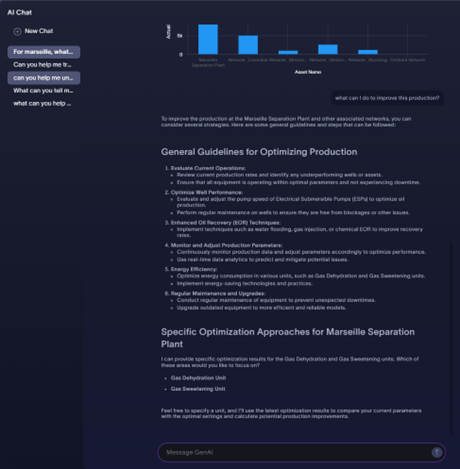
2. Data Agent: Unleashing the Power of Data
- The Data Agent is the analytical powerhouse of the multi-agent system. It is equipped with tools to analyze and visualize both real-time and historical data, offering users a comprehensive view of their operations.
- Real-Time and Historical Data Queries: The Data Agent can handle complex queries related to both real-time and historical data. Whether it’s tracking production metrics, monitoring equipment performance, or analyzing trends over time, the Data Agent provides the insights needed to make informed decisions.
- Dynamic Dashboards: One of the standout features of the Data Agent is its ability to create dynamic dashboards that update in real-time. These dashboards can be customized to show the most relevant data, allowing users to monitor operations at a glance.
- Enhanced User Experience: By simplifying the process of data analysis and visualization, the Data Agent enhances the overall user experience. Users can easily access the data they need, in the format they prefer, without having to navigate complex systems or perform manual calculations.
3. Simulator Agent: Bringing Simulations to Life
- The Simulator Agent is designed to work with SLB production software , offering users a highly interactive and flexible simulation environment. This agent plays a crucial role in helping users model and optimize their production processes.
- Flexible Adjustments to the Simulation Model: The Simulator Agent allows users to make real-time adjustments to the simulation model, reflecting changes in production parameters, equipment configurations, or environmental conditions. This flexibility ensures that the simulation remains accurate and relevant, even as conditions change.
- Personalized Experience: The Simulator Agent can be tailored to individual users, offering a personalized experience that aligns with their specific needs and preferences. Whether it’s adjusting the interface or customizing the outputs, the Simulator Agent makes simulations more accessible and user-friendly.
- Seamless Integration with Digital Twins: The Simulator Agent is designed to integrate seamlessly with other digital twins within the organization. This integration allows for a holistic view of the production process, where simulations can be informed by real-time data and vice versa. The result is a more accurate and comprehensive understanding of the production environment.
- Accessibility to Non-Experts: One of the key advantages of the Simulator Agent is its accessibility. It simplifies complex simulations, making them accessible to users who may not have a deep technical background. This democratization of technology ensures that a wider range of users can benefit from advanced simulation capabilities.
Adding Value to Customers and the Production Systems Division
The development of this multi-agent system represents a significant step forward in the digital transformation of the Production Systems division. By integrating GenAI and LLMs into our operations, we are not only improving our internal processes but also enhancing the value we provide to our customers.
For customers, the benefits are clear:
- Improved Decision-Making: With access to real-time insights, personalized recommendations, and intuitive interfaces, customers can make better decisions faster.
- Increased Efficiency: Automation of routine tasks, instant troubleshooting guidance, and seamless access to expertise reduce downtime and improve operational efficiency.
- Enhanced User Experience: The combination of intuitive interactions, personalized experiences, and dynamic data visualization ensures that customers have a smooth and productive experience.
For the Production Systems division, the multi-agent system offers:
- A Competitive Edge: By adopting cutting-edge technologies like GenAI and LLMs, we position ourselves as leaders in digital innovation within the oil and gas industry.
- Operational Excellence: The efficiencies gained from automated processes, real-time insights, and enhanced decision-making translate to better performance and reduced costs.
- Scalability: The modular design of the multi-agent system allows it to be scaled and adapted to meet the evolving needs of the division and our customers.
Conclusion
The integration of Generative AI and Large Language Models into the Production Systems is not just a technological upgrade; it’s a strategic move that enhances our digital offerings and provides significant value to our customers. The multi-agent system, with its SME Agent, Data Agent, and Simulator Agent, exemplifies how these technologies can be harnessed to improve decision-making, enhance user experiences, and streamline operations.
As we continue to innovate and expand our digital capabilities, the benefits of GenAI and LLMs will become increasingly apparent. By staying at the forefront of these advancements, we are not only improving our own operations but also helping our customers navigate the complexities of the oil and gas industry with greater confidence and success.